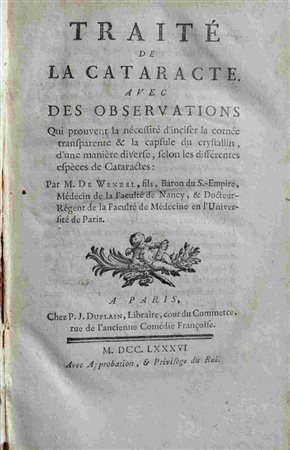 Bertolami Fine Art - Sendlinger Straße 24, 80331 Monaco
Bertolami Fine Art - Sendlinger Straße 24, 80331 Monaco
WEB AUCTION 118 - LIBRI E AUTOGRAFI WEB AUCTION 118 - LIBRI E AUTOGRAFI
Thursday 16 June 2022 hours 14:00 (UTC +01:00)
Michael Johann Baptist De Wenzel (1724 -1790), Jakob Wenzel (? - 1834?): Traité de la cataracte avec des observations… A Paris, chez P.J. Duplain, 1786
Michael Johann Baptist De Wenzel (1724 -1790), Jakob Wenzel (? - 1834?)
Traité de la cataracte avec des observations qui prouvent la necessité d inciser la cornée transparente & la capsule du crystallin, d’une manière diverse, selon les différentes epèces de Cataractes: Par M. de Wenzel, fils, … A Paris, chez P.J. Duplain, 1786
§ 8vo (13x2x2,5 cm.); xij, 224, [2] pp., signature; a1-2, b1-4, A-O1-8, []1, 1 engraved folding plate. Contemporary calf, spine and leading edge gilt, gilt title piece on spine. Front hinge weak, spine a little worn, title piece loosening. Content very fine.
First edition. Actually written by Jakob Wenzel the work describes the method used by his father, the Baron Michel Jean Baptiste and it is generally attributed to the latter. That both of them were ophthalmologists and that the son wrote about the work of the father, create quite a confusion and often their work and their lifes are mixed up; it is thus possible to find online that Michel Jean Baptiste (who died in 1790) was appointed oculist to George II in 1808, the date of death is given by different websites as 1819, 1820 or 1834 (again confusing father and son) and no mention is generally done of the actual authorship of the work that, even though the title clearly states M. de Wenzel, fils, it is generally attributed to the father. It is of course unfortunate that M(onsieur), usual in French before the surname, can be mistaken in this case with the father’s initial M(ichel), but such a confusion would have been impossible at the time of publishing. “... Wenzel wrote nothing. Much of what we know of him comes from the pen of his devoted son and disciple, Jakob, ... So strongly was the young Wenzel attached to his father, and so concerned was he to defend his father's achievements that his own personality becomes quite submerged in that of his parent. His books have the authorship ascribed to "de Wenzel (Michel-Jean-Baptiste) fils". It is not surprising that the Larousse of 1876 confuses the two and, under the name of the father, records the career of the son” (Wyman, p. 78-79).
The treatment of eye diseases was at the time largely neglected by respectable medical men and generally practised by irregular practitioners which were usually regarded as quacks and charlatans. Without an officially recognized training, Wenzel has been often considered as such a quack, but his ability and his successes were nontheless recognized and he was appointed Oculist to the Queen of Hungary (Maria Theresa) and Oculist to the King (George II). Wenzel accepted the opinion of Daviel who, around 1750, advocated a new treatment for cataract, by extraction instead of the method of couching traditionally in use, an opinion that was not easily accepted and remained controversial for a long time; Wenzel improved the method and developed a remarcable ability in the performance of the operation, so much so that his intervention was required by high-placed people from several countries. “In the Traite de la cataracte of 1786, the young Wenzel explained that he was describing the methods used by his father for about 35 years.” (Wyman, p. 79). Conscious of the changing times, Wenzel wanted his son properly trained, and Jakob studied with Joseph Barth, who had been trained by Michael Wenzel in the cataract operation. “The Baron, aware of his own limitations, left his son in Vienna to study anatomy and diseases of the eye under Barth's tuition, and so become properly trained. The young Wenzel obtained his doctorate in Paris in 1779. By 1783, he was one of the doctors Regent in the Faculty of Physic in Paris, and by 1786 he was a member of the Faculty of Medicine of Nancy. He later became a member of the Academie de Medecine. The son thus became part of the medical establishment, and achieved the respectability and recognition denied to the father.” (Wyman, p. 82).
& A.L. Wyman Baron de Wenzel, Oculist to King George III: his impact on British ophtalmologists In:






